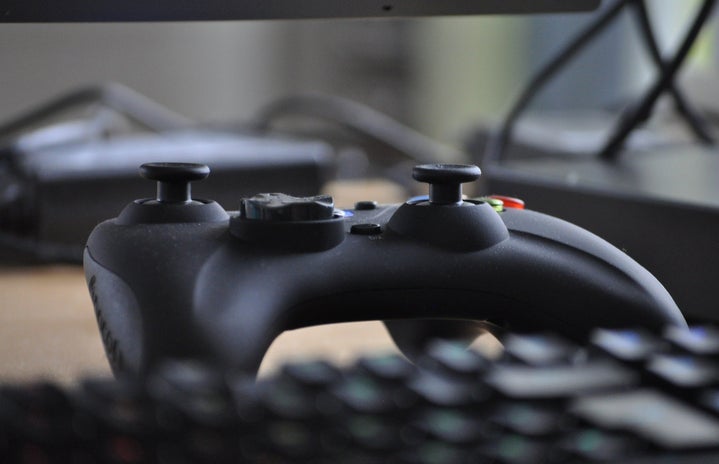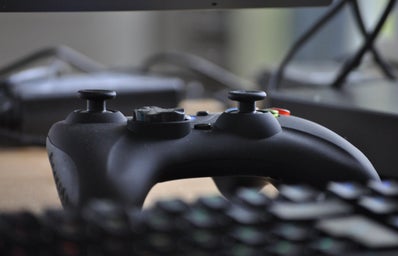Over a year ago, I wrote an article called “How Video Games Helped Me Persevere” that detailed my experience with video games. At that time, I had only played a few games like Pokémon, Celeste, and Hades, and I was nowhere close to beating Hades. Now I have my own PC setup, many more games in my repertoire, and I can proudly say that I beat Hades! Writing these articles is a great way for me to see the growth I have made towards overcoming my fear of failure. Video games have truly given me a safe space to become comfortable with failing, and allowed me to learn how to learn from my mistakes. Video games allowed me to develop perseverance, a skill that needs practice and work to achieve, and that I became very familiar with after dying in games countless times.
Well, at least I thought I knew perseverance, until I dove into a whole new genre of gaming: fighting games. I naively figured they would be just like any other game; it might take me a while to learn the mechanics, but once those are figured out, I can play through the story without many roadblocks. Most games do get harder as you go on, but you become better at using the mechanics and have multiple attempts at solving a puzzle or defeating a boss. In fighting games, however, you do not have the luxury of fighting computer-controlled enemies that use the same few moves against you and follow specific movement patterns. When you play online matches outside of the training room, your opponents are other players around the world. If this competitive human element were not daunting enough, there is also the added difficulty of learning an entire new set of mechanics, including special moves, bursts, and dusts that can really turn the tide of a match.
There’s an intrinsicality to fighting games that comes with playing different games, as they all have similarities to one another, but since I was new to this genre of games, I did not have this prior knowledge to rely on. So when I first entered the training room of a fighting game, I felt somewhat lost. There seemed to be so many concepts at work in the game that I did not understand, along with terminology I was unfamiliar with. It felt similar to when I started playing ice hockey. Most hockey players start when they are a child, around the same time they learn to ice skate. Though I have been skating my whole life, I used figure skates and had never tried hockey until my junior year of high school, when I joined a local team. I was just as lost and uncertain as I was when I picked up a fighting game. I did not know all the rules, how to skate properly on hockey skates, or even how to use a hockey stick.
For someone who struggles with being afraid of failing, starting new things is difficult for me. I did not know how to learn something new without focusing on everything I was doing wrong and feeling like a failure. That’s part of why I decided to learn how to play fighting games. When I started Guilty Gear Strive and finally left the training room to try an online match, I lost. Horribly. I barely got a single hit in, and the match seemed to fly by before my eyes. One second the match was starting, the next, all my health was gone and I had been defeated. All the other matches I played that week went similarly, always losing, never being able to tell what exactly was going on during the match. I hated it. I was doing so many things wrong during each match, like not blocking, or mashing buttons, that I had ample material to support the idea that I was awful at fighting games.
But, I had to remind myself that no one is good at something when they first start it. Part of learning is understanding and accepting that you’re starting at the very beginning, with no prior training and experience to support you. When you learn something new, you are creating and building that experience, and that in and of itself is a skill. A valuable resource that helped me understand this is the YouTuber Sajam. Stephen Lyon, known by his online alias Sajam, is a former professional fighting games player and currently a commentator within the Fighting Games Community (FGC). His channel is packed with videos of tutorials and tips, commentaries, game playthroughs, and discussions on various topics such as fighting game strategy and fighting game design and philosophy. My personal favorite of the latter is his series “Learning How to Learn.”
The “Learning How to Learn” series focuses not only on learning how to play fighting games specifically, but on how to actually learn the skill of learning. In one of his videos of the series, “Sajam Talks How to Learn & Improving as a Player,” Sajam explains some key things you have to realize when you want to improve at something, be it a fighting game, a musical instrument, or ice hockey. One of these is that you have to realize you will suck when you first start, and that there is always room for improvement. This seems self-explanatory, but as I soon found out with Strive, this can be super frustrating and disappointing! It may even be discouraging if you’re like me and struggling with thoughts of failure. But as Sajam points out, there will always be room for this improvement. As soon as you believe you are the best at something, you limit yourself by not allowing yourself the opportunity to go further, learn more, and become even better.
Additionally, it’s important to keep in mind too that everyone has sucked at some point! Even players at the professional level will lose matches and be critical of themselves for getting inputs wrong, not correctly reacting to a situation, or dropping a combo. Experienced players also understand that some players are new to the game! I used to feel like a hindrance to the upperclassmen on my hockey team, but playing people better than you helps you become better, and the same is true for playing online matches. Playing people above your skill level allows you to try and play up to that level, helping you learn from them.
Sajam also points out that when you are learning anything, it’s easy to become focused on immediate results. When I started playing fighting games, I was solely focused on winning the match; winning was something I rarely achieved with this mindset. We live in an age of instant gratification, but learning is about building skills, not winning or losing. He explains how you should be playing not to win, but to improve, and this is something that has helped me immensely in keeping a positive mindset during online matches in Strive, as well as when playing hockey games. When you play to improve, you can focus on individual areas where you can move forward, and when you slowly move forward in these separate areas, you begin to improve as a whole.
Sajam’s emphasis on focusing on these individual skills, not everything at once, has really helped my “all-or-nothing” mindset when I play. I often used to focus on all the things I was doing wrong, which altogether made me feel like a failure. Winning is not a sign of improvement, though it often is the goal of many new players, myself included. For instance, if you have a problem with blocking, you could play a whole match by mashing buttons and happen to win, but if you don’t block at all during the match, you are not improving as a player. But by honing individual issues or bad habits, you are improving your gameplay and helping yourself to consistently win in the future.
After watching this series of his, I took note of what my strengths and weaknesses were when playing both fighting games and hockey. For example, I often panic during matches and mash buttons instead of calmly blocking. Similarly, during hockey games, when I get the puck I used to panic and immediately pass it off to someone else, sometimes even failing to look up before I do so and causing a turnover of possession. Learning not to panic during matches and games was not something I would be able to wake up one morning suddenly knowing how to do; staying calm in the heat of the moment was a skill I had to work on during every match and game in order to improve.
This is where perseverance comes in. In other video games, it is easy to play a level over and over again when the level stays the same and you are taken back to the same starting point each time you die. But in fighting games, you play a new match each time and against different people. It gets frustrating and discouraging when you lose over and over again, but each time you decide to play another match or spend a little extra time in the training room, you build your perseverance. The stronger your perseverance is, the more practice you can get in and the more you will improve in the long run. Just like learning, perseverance is a skill that can be developed and honed if you dedicate time to it.
Guilty Gear Strive is the latest installment in the Guilty Gear game series, and I highly recommend it if you’re looking to try a fighting game for the first time. It has great music, a wide cast of cool characters, an interesting storyline, and beginner friendly mechanics. And if you’re interested in playing fighting games or just learning a new skill, I highly recommend checking out Sajam’s content. Whether you want to improve your perseverance or are just looking for something new to try, fighting games are a great challenge to take on!


